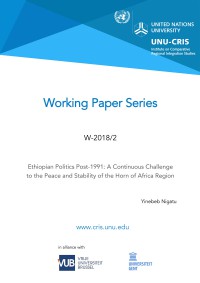Ethiopian Politics Post-1991: A Continuous Challenge to the Peace and Stability of the Horn of Africa Region

The ruling Ethiopian People’s Revolutionary Democratic Front (The EPRDF) came to power after it defeated a self-proclaimed Marxist military junta in 1991, marking a new beginning in the contemporary political history of the country. The EPRDF has remained in power ever since and introduced a number of reform packages: both economic and political. Despite facing noticeable challenges in the economic sector, the country has registered spectacular economic growth over the past two decades – so that Ethiopia now has one of the fastest growing economies worldwide. The country’s economic boom in turn helped to generally improve socio-economic conditions as evidenced in the attainment of most of the Millennium Development Goal targets. However, the promised political dispensations that it was hoped would accompany the economic reforms, have remained problematic. After twenty-five years of EPRDF rule the country still finds itself in a precarious situation, with the last two to three years in particular being marked by political unrest of a hitherto unseen magnitude since the EPRDF assumed power. The Political processes have been contested and hence the legitimacy of the reform package remains not only questionable but requires a fundamental rethinking. The repercussions of any failure in this regard would have far reaching consequences for the peace and stability of the Horn of Africa region as a whole, given the regional importance of Ethiopia, often portrayed as an anchor of peace and stability in this otherwise fragile and conflict affected region of Africa.
